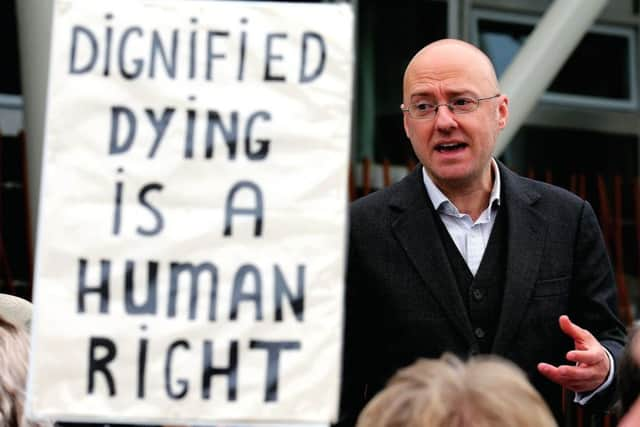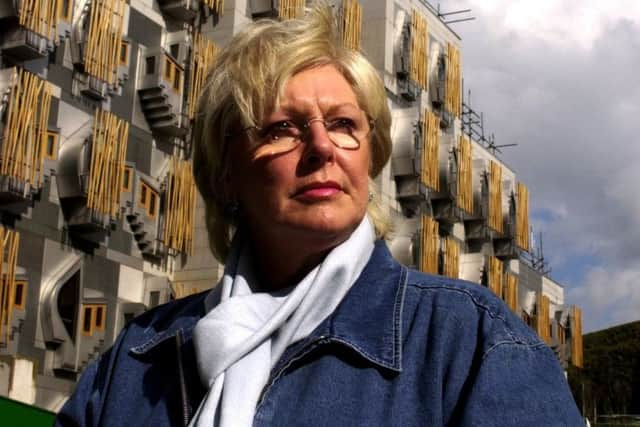Insight: Attitudes to terminal illness are changing


‘With everybody I’ve spoken to, it’s not the pain that they mention first – it’s the loss of control over their own lives, that total dependency on other people with no hope of that ever mitigating.”
Speaking seven years ago, the late Margo MacDonald MSP was explaining why she believed that, should illness make life agonisingly difficult, we should all have the right to choose to die with dignity. For some people, she argued, life reached a point where it was simply no longer worth living, and if that happened, then who were any of us to condemn them or their families for seeking a way to end things?
Advertisement
Hide AdAdvertisement
Hide AdAs she promoted her End of Life Choices Bill, MacDonald said it was an idea whose time had come. The bill failed.


The Independent MSP for the Lothians was disappointed but undeterred and set about trying to gather more support for her proposal. After the 2011 Holyrood election, she put forward the Assisted Suicide (Scotland) Bill. She was not to live to see her idea being rejected by MSPs for a second time.
After MacDonald’s death last year following a long period suffering with Parkinson’s Disease, Green MSP Patrick Harvie took on responsibility for the bill, which was rejected last Wednesday by 82 votes to 36, a margin which surprised the politician, who admits he was prepared for failure but hoped to win the support of as many as 45 members.
MSPs were given a free vote, with whips agreeing that this was an issue of conscience rather than partisan interest. Among those who supported the right to assisted suicide were more than 20 members of the SNP, including government ministers Richard Lochhead and Fiona McLeod, and Holyrood’s justice committee convener, Christine Grahame. Labour’s Claudia Beamish and Elaine Murray were backers, as was the Liberal Democrat Jim Hume and the deputy leader of the Scottish Conservatives, Jackson Carlaw.
During Wednesday’s debate there were profoundly moving contributions from members with opposing views.


The SNP’s Dennis Robertson, whose daughter Caroline died, aged 18, in 2011 after struggling with a severe eating disorder, opposed the bill. He told MSPs: “She wanted to die, she said on several occasions, ‘Let me die, I can’t live with this illness, you need to help me die, please help me die’. I couldn’t do that. I loved her too much. I wanted her to live.”
Robertson’s colleague, George Adam, spoke of his wife Stacey as he urged colleagues to allow the bill to make progress. Adam said: “Those of you who know her know Stacey loves life – one of her most endearing and attractive qualities is her sheer lust for life, but what happens if she’s so ill that she no longer has that quality that she currently has?’’
MSPs took their decision just days after British businessman Jeffrey Spector travelled to the Dignitas clinic in Zurich to end his life. The Swiss facility charged Spector £8,400, a sum he paid because he couldn’t legally be helped to die in the UK.
Advertisement
Hide AdAdvertisement
Hide AdSpector, an advertising executive and father of three, called for a change to UK law in the days before he flew to Zurich with his family. The 54-year-old said that he was being forced to die “too early” because of the UK’s legal system. Had assisted suicide been an option, he’d have waited and tried further high-risk treatment on a final tumour, but the fear that such surgery might leave him paralysed and unable to travel to Dignitas had driven his decision. Spector, who died on 22 May, said: “I am going too early because of the law in the UK. If the law was changed I would not be doing it today.”


Reflecting two days after MSPs refused to countenance the idea that Scots should be allowed, just as Spector had, to take their lives with the help of others, Harvie was sanguine about losing a parliamentary vote for which he had been preparing for more than a year. Despite defeat, there had been progress towards the eventual introduction of legislation giving the right to die. The issue had not gone away, Harvie insisted.
“I knew it was unlikely to pass but support has grown. Perhaps not by as much as I’d hoped, but it has grown,” he said. “I won’t walk away from this. Those of us who support this principle will now try to build a cross-party approach to ask the Lord Advocate to look at prosecution guidelines.”
So does Harvie, who worked closely with MacDonald on the bill, see practical benefits from the debate having taken place even though the bill has failed?
“We do have a chance now to make the end of life better for those with terminal illnesses,” he said. “Around 50 Scots who are terminally ill commit suicide every year and we have the opportunity now to look at how we support people in those circumstances.
“Debating the bill has added to momentum around that subject and I think that’s valuable. It is important for us to ask: how do we make end-of-life care the very best we can?”
Kelvin Holdsworth, the Episcopal Church Provost of St Mary’s Cathedral in Glasgow, supported the decision of MSPs to reject the bill but agrees with Harvie on that point.
“I want us now to talk about pain relief, funding for hospices, funding for pain clinics. Those are important things that we can do something about,” he said.
Advertisement
Hide AdAdvertisement
Hide AdAlthough the decision of many MSPs who voted down the bill was informed by their faith, Holdsworth believes that religious belief should not necessarily be assumed to mean one is opposed to the idea of right-to-die laws.
He said: “I actually think most of my congregation would now be in favour of the bill. People’s views are changing; we are more willing than ever before to discuss death and dying.
“But the people who have most to say about this are those who haven’t spent time around people who are dying.”
Holdsworth said that it was his perception that the debate, so far, had been one-sided that prompted him to speak up in favour of the vote against the bill. “I do think that it’s very difficult for people who don’t support change to get much leeway when this is reported. We see the BBC reporting and we get the story of some poor chap who has chosen to end his life at a clinic and we don’t hear much from those who oppose. It’s not very balanced reporting and that’s a reason I decided to comment.”
Conservative MSP Murdo Fraser, a practising Christian, was one of the 82 who voted against the bill. He identifies himself as a supporter of personal freedom yet believes allowing assisted suicide to be a step too far.
It would, he said, have been an admission by society that some lives are worth less than others.
He said: “It’s little wonder that so many disability rights groups are opposed to this legislation. Many human beings have lives which are far from perfect; many live daily with disability, with pain and with suffering. But that does not make them any less human, or any less entitled to human dignity.
“To pass a law saying that those who are suffering should be entitled to assistance to kill themselves is for this Scottish Parliament to state that some lives are worth less than others.”
Advertisement
Hide AdAdvertisement
Hide AdHarvie said: “Of course, I see the point of view of many of those who oppose the idea, including some disability groups that see this in the context of us living in a society that doesn’t see all bodies as of equal worth. I understand that.
“It is still hard to find organisations – whether they are disability groups, churches, medical bodies – that would speak in favour, but within these organisations there are many individuals who supported the bill.”
Fraser said that support for the bill would have suggested a society that didn’t care for the terminally ill. “The question we have to ask is this: have we really become a society which says that the best answer we can provide for those in suffering, in end-of-life situations… the best we can do, is to help them kill themselves? Is that really all that we can offer?
“That sounds to me a desperately cold, soulless society, and I think that here, in Scotland, today, we are better than that.”
Holdsworth believes the debate in Holyrood should mark the start of a new discussion with the General Medical Council about the treatment doctors can give to the terminally ill.
And he cites the case of Harold Shipman – the GP jailed for killing 15 patients and believed to have murdered 250 – as a key reason that discussion has not yet taken place.
“I support clarification of the law rather than change and I also support discussion of General Medical Council guidelines, too. I have no problem with treatments being given that may shorten lives but there is a lot of nervousness around this since the Harold Shipman case,” said Holdsworth.
“In a way, the person who has caused us to stop talking about that aspect of end-of-life care is Harold Shipman and we have to get past that and have that discussion.”
Advertisement
Hide AdAdvertisement
Hide AdMacDonald was wrong when she said in 2008 that assisted dying was an idea whose time had come, but Harvie believes that it will have its day in time. He predicts that there is unlikely to be an attempt to legislate in the next Scottish Parliament after the 2016 elections but that there will be further debate between MSPs.
“I believe there will be a change in the law. This is still an important issue and there is still momentum behind change. It will happen one day,” said Harvie.
Holdsworth says a fundamental change in the way people feel about discussing death is important. Regardless of the outcome of the vote last week, we are, he says, more comfortable discussing the issue, both in practical and emotional terms.
“People do want to talk about death and dying, they want to ask questions about it. I run a workshop at the cathedral on how to plan your own funeral and people use it to talk about death. These aren’t people who are dying but people who want to talk about end-of-life issues; the taboo is lifting and that’s healthy.”
The organisation My Life, My Death, My Choice, which campaigned in favour of the bill, pointed out that the 36 MSPs who voted in favour was up from the 16 who gave it their backing five years ago.
A spokesman said: “Politicians are increasingly ill at ease with the current law surrounding assisted suicide and are beginning to catch up with the views of their constituents. It may be that MSPs had concerns about some of the details in this bill but the principle that a change in the law needs to be examined seriously has been established.”
But, speaking after the bill had been defeated, Dr Gordon MacDonald of the Care Not Killing group – which delivered a petition containing the signatures of 15,000 people who opposed a change in the law to the Scottish Parliament last week – said the decision by MSPs had been a “major victory” for the most vulnerable in society.
Fraser agrees and will continue to fight hard against any shift in the current legislation. “This was the second attempt to legislate for assisted suicide; it may not be the last, but I hope that the view of the Scottish Parliament on the issue is now clear,” he said.
Advertisement
Hide AdAdvertisement
Hide AdBut with Labour’s Shadow Justice Secretary Lord Falconer pushing his own proposals for assisted suicide to be made legal south of the Border, the chances of this issue going away seem slender. «
Twitter: @euanmccolm